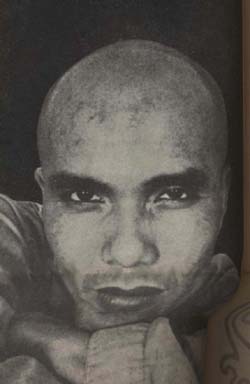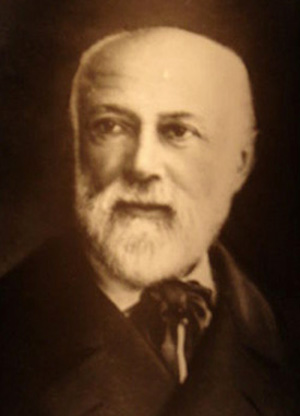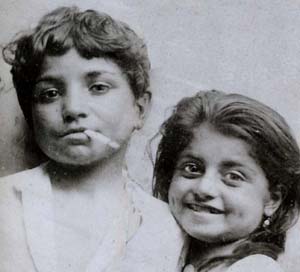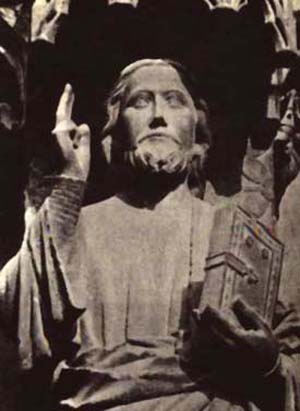 |
Formation of Children
The Eyes and the Gaze
Marian T. Horvat
Our eyes reveal who and what we are. This is the lesson of Chapter Six of the Little Manual of Civility. It sets out the three responsibilities a young man has in the care of this feature.
First, a man should learn to read the faces of his neighbor so that he can respond properly to them. If he does this, he will take care not to provoke a person who is in a bad mood or angry. He can avoid relations with those who are furtive or devious. He will be inspired by the honesty and candor of the good friend. In short, as the Manual advises, a man has the duty to become a “face-reader.” He should also maintain an amiable and forthright expression before others. A young man should master himself and his expression. How disagreeable to everyone is the sulking, pouting face of the spoiled boy or the moody face of the temperamental youth.
This first point is particularly interesting for us Americans who tend to believe that faces and gazes do not reflect the internal disposition of a person. We should note carefully how common and normal it is for other peoples to consider the analysis of the physiognomy as one of the most elementary things a young man should learn to do.
Second, we have a natural duty to keep our eyes physically clean and guard them from harm. At the time this manual was written, the television had just been introduced; consequently it was difficult to imagine the extent of eye damage and fatigue that could result from the long hours watching TV or sitting in front of a computer screen customary in most homes today. Permanent eye damage can result if more care is not taken.
Third, morally speaking, what we permit the eyes to see has an effect on what we think. Our Lord clearly taught that a man can sin, even mortally, with his eyes if he looks at persons or pictures that evoke impure thoughts. Men must practice custody of the eyes from the time they are boys. Good parents and teachers must teach youth to avert the eyes from immoral pictures, bad scenes on media screens, and things that can lead to sinful thoughts.
How many hovering parents outfit their sons with a tricycle helmet to protect their faces and eyes, and then ignore the great dangers of the immodest and vulgar images in television commercials and magazine advertisements that enter and fix themselves in the mind of the child! How many fathers forget that a son notices his admiring and lustful glances toward immodestly dressed women and will later imitate him! A child and a young man learn from example much more than from lessons in books or sermons on morality.
Let us strive, then, to compose our expressions by the practice of self-discipline and our eyes by the practice of Catholic modesty.
Here is my translation of Chapter Six.
The exterior is the reflection of the interior
Of all the parts of the human body, the face is certainly the most distinguished, noble, beautiful and expressive. The face is the part of the human body that expresses externally the sentiments and feelings of a man. On it one finds a painting of the interior man: the spirit, will, sentiments, feelings, emotions, sorrows and pleasures, virtues and vices.

Revolt and hatred is present in the physiognomy of this Buddhist monk |
Impressions and age transform the physiognomy, which can be described as the general expression of the face. One same face serves for laughter and weeping; fury is replaced by the smile; a shocking or offensive word brings a flush to the check and an intense moral agony raises a sweat. A deep sadness covers the face with a somber veil. Happiness illuminates it, a smile effuses it like a ray of light. The eyes shine with pleasure or anger, with contentment or hope.
All these transformations are direct reflections of states of soul, a definite translation of a man’s feeling, thinking and state of conscience. No telegraph system ever possessed such varied and rapid signals.
From this it follows that in dealing with others, every person should be a face-reader, that is, he should know how to read and interpret the signs stamped on the physiognomies of those with whom he lives and works.
Another duty that living with others imposes on us is to offer to others an amiable and benevolent physiognomy, wherein others read cordiality and affability. A face that attracts or repulses others does not depend on the regularity or natural lines of our features; rather, it relies on the expression of goodness or harshness that we project in our exterior.
Repulsive physiognomies are those that lack an interior, intellectual or moral serenity, or reflect an unbalanced or frivolous state of soul. For example, it is unsettling to see a person maintain a dark somber air during a happy narrative, or have a smiling cheerful demeanor when listening to the story of a disaster or sorrowful event.
The eyes are the light of the body
The eyes are the most noble and precious organs that embellish man. With them we enjoy an empire of unlimited extension; we can contemplate both the infinitely grand using a telescope and the infinitely small by means of a microscope, both respectively immense and marvelous.
The eyes – and its visual memory – are the strongbox in which we store the physiognomies of our loved ones, as well as the treasured panoramas and landscapes of our homeland. Nothing translates the thinking and spirit of a man as well as the eyes. They animate and illuminate the physiognomy; they are the most distinguishing and personal characteristic of a man.

St. Therese of Liseaux said she would study the features of her father, Louis Martin (above), to understand the countenance of God |
When we cannot observe the eyes, everything becomes undecipherable in a physiognomy. When a man hides his eyes behind dark glasses, he becomes enigmatic. To the candid, upright soul, he appears to be hiding a reprehensible aspect of his character or some such defect.
In every person, in childhood above all, the clarity of the gaze is the reflection of the purity of the soul. In the gaze of a mother a whole history of maternal love is condensed and summarized. From the eyes come tears, unequivocal signs of strong emotion. Among the Hebrews and Arabs, the eye means fountain; in fact, the eyes pour forth streams of tears, torrents of anger, or a flood of goodness.
There are eyes that are furtive, hard, and dry. Others are sincere, limpid, amiable, and captivating. Some irritate, others please. Some repel, others attract and encourage. The human gaze has an indescribable influence and power. The image of the gaze of a father and mother, for example, will remain impressed on the memory of the child throughout his whole life. The sweet light of their eyes can direct children on the correct road. Fortunate the child who finds such a gaze in the bitter hours of adversity and temptation! How many men were saved from despair by the understanding he felt from a friendly gaze.
The eyes have a powerful influence to captivate and seduce or repel and terrorize, to punish or reward, to animate or discourage. With his gaze a man dominates wild beasts, tames lions and subjugates the ferocity of tigers.
The duty to care for these precious tools
The first natural duty is, then, to treat our eyes well. Every instrument, above all when it is delicate, needs to be kept clean to be preserved in a good state. Now, we have only one pair of eyes; therefore, they should be treated with the greatest care and consideration.
One should not read or write without sufficient light in the room. Youths are frequently careless in this point; later they lament their imprudence because, even in this world, everyone has to pay the consequences of actions that transgress the wisely established natural laws.
Likewise, too much light, just like sudden and too prolonged flashes, are harmful to the eyes. The florescent lights of the great cities that flash on and off in multiple colors can easily cause eye weakness or problems. The same can be said for those who watch too much television, frequent the movie theaters, or use professional equipment that strains the eyes.
It is not enough to protect the eyes from these external dangers. Often we can suffer serious eye problems because of a lack of hygiene. We should never touch or wipe these delicate organs with dirty hands, fingers, cloths or handkerchiefs.
Respect and purity

Above, St. Aloysius Gonzaga maintained his purity and innocence until his death.
Below, the deceitful and selfish gazes of Sicilian gypsy children already reveal a loss of innocence
 |
There is another extremely important care we should take, that is, to always make good use of our eyes. The supreme law is to always keep guard over them within the limits of Catholic modesty. Our eyes should not rest on objects that awaken bad thoughts.
Let our eyes serve us to observe and admire the grand spectacles of nature and heavens, the qualities and the prodigious variety of minerals, plants and animals.
We should ponder even more the gazes of our parents, reading in them their tenderness and love; at times we can also read the displeasure that our faults cause them. Their severe gazes serve to correct us and keep us from going astray.
The eyes of a good son expresses love, reverence and fidelity, just the eyes of a bad son reveal the lie, disloyalty and a bad state of soul.
Instead of furtive and deceitful gazes, let us seek to have an open, frank physiognomy, one that is filled with compassion for a suffering neighbor, submissive and respectful toward the elderly, and at the same time always firm and resolute against the enemies of God and country.
The eyes are windows of the soul; for the incautious, spiritual death enters through these windows. It is necessary to be very vigilant over the sense of sight, insomuch as gluttony of the eyes, as Bossuet says, is a vice that can never be satiated and has no limits or bottom. If one does not have custody over the eyes, they become infernal hooks that snatch the soul without fail and make it fall into sin. We need only recall the wife of the Pharaoh, Puttifar, who tried to seduce Joseph; the accusers of the chaste Suzanna; the imprudence of the gaze of David on Bathsheba and its sad consequences.
The eyes are the mirror of the soul. Attila, the ferocious king of Huns, had small, restless, fiery eyes, athirst for pillage and blood. In Mantua, he was subjugated by the serene and grave gaze of St. Leo the Great. The tender gaze of the Divine Savior opened a perennial fountain of tears of contrition and salvation in the soul of the unfaithful Peter.
The most beautiful spectacle in the world

Le Beau Dieu (the Good God)
Amiens Cathedral, France |
The face of the innocent man is so handsome that an ancient author was correct when he affirmed that the most beautiful spectacle in the world is the face of a young man of twenty years who knew how to preserve his innocence.
Here follows the physical description of Our Lord’s face and demeanor from an original letter of the Roman official Publius Lentullus in a report to the Senate:
"There appeared in these our days a man of the Jewish Nation of great virtue, named Jesus, who is yet living among us… A man of tall stature, and comely, with a very reverent countenance, such as the beholders may both love and fear, his hair fair and tending toward chestnut, full ripe, straight to His ears, whence downwards more curling and wavering about His shoulders. It is parted in the middle of His head after the manner of the Nazarenes. His forehead is straight and unfurled; His face without spot or wrinkle, beautified with a lovely red; His nose and mouth so formed as nothing can be reprehended; His beard thickish, in color like His hair, not very long, but forked; His look innocent and mature; His eyes grey, clear, and quick.
"In reproving hypocrisy He is terrible; in admonishing, courteous and fair spoken; pleasant in conversation, mixed with gravity. It cannot be remembered that any have seen Him laugh, but many have seen Him weep. In proportion of body, most excellent; His hands and arms delicate to behold. In speaking, very temperate, modest, and wise. A man, for His singular beauty, surpassing the children of men”

Posted October 31, 2006


Related Topics of Interest
 Four Ways to Discern a Man's Soul by His Appearance Four Ways to Discern a Man's Soul by His Appearance
 The Eyes Are the Mirror of the Soul The Eyes Are the Mirror of the Soul
 The Face Reveals the Heart of the Man The Face Reveals the Heart of the Man
 Small Manual of Civility - Chapter 5: Order i n the Professional Life Small Manual of Civility - Chapter 5: Order i n the Professional Life
 Small Manual of Civility - Chapter 4: Order and the Spirit of Order Small Manual of Civility - Chapter 4: Order and the Spirit of Order
 Small Manual of Civility - Chapter 3: How to Sit, Stand, Walk Small Manual of Civility - Chapter 3: How to Sit, Stand, Walk
 Small Manual of Civility - Chapter 2: Bearing Small Manual of Civility - Chapter 2: Bearing
 Small Manual of Civility - Introduction and Chapter 1 Small Manual of Civility - Introduction and Chapter 1
 Dressing Well - Vanity or Virtue? Dressing Well - Vanity or Virtue?
 St. Isidore of Seville on the Importance of Being Dignified in Manner St. Isidore of Seville on the Importance of Being Dignified in Manner

Related Works of Interest
|
|
Formation | Cultural |
Home | Books | CDs
| Search | Contact Us
| Donate

© 2002- Tradition in Action, Inc. All Rights Reserved
|
 |
|